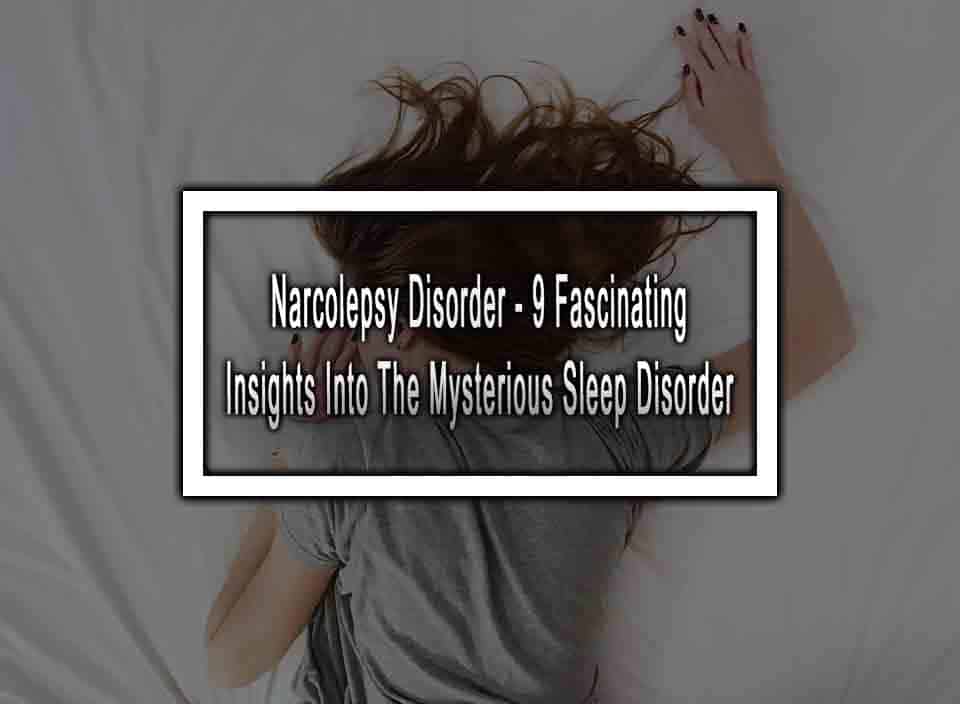Table of Contents
ToggleNarcolepsy Disorder: Let’s Dive into the Bizarre World of Narcolepsy
Narcolepsy is a unique neurological sleep disorder that can be both intriguing and challenging for those who experience it. Its symptoms, causes, and treatment methods often baffle even the most knowledgeable sleep experts. In this article, we will explore ten fascinating facts about narcolepsy that will leave you both fascinated and enlightened.
1. The Mysterious Sleep Thief
Narcolepsy isn’t your ordinary drowsiness; it’s a chronic neurological disorder that affects the brain’s ability to regulate sleep-wake cycles. Individuals with narcolepsy frequently experience excessive daytime sleepiness (EDS) and may even fall asleep suddenly and uncontrollably.
2. Unique Symptoms You Wouldn’t Believe
Narcolepsy presents a range of unusual symptoms beyond daytime sleepiness. Cataplexy, a sudden loss of muscle tone triggered by powerful emotions, can cause someone to collapse or experience temporary weakness in specific muscle groups, often triggered by laughter or surprise.
3. The REM Paradox
Rapid Eye Movement (REM) sleep is commonly associated with dreaming, but for individuals with narcolepsy, the line between wakefulness and dreaming can blur. These individuals may experience dream-like hallucinations and sleep paralysis, making their sleep experiences truly perplexing.
4. Tricky Timelines
Diagnosing narcolepsy can be a lengthy and challenging process due to its varied symptoms and similarities to other sleep disorders. Often, individuals experience significant delays in receiving a proper diagnosis, leading to years of confusion and frustration.
5. The Genetics Behind the Yawns
Research suggests that narcolepsy may have a genetic component. Certain variations in the HLA complex, a group of genes associated with the immune system, are linked to an increased risk of developing narcolepsy. However, not everyone with these genes will develop the disorder.
6. Wake Up Call
The impact of narcolepsy on daily life can be profound, especially in the workplace. The constant struggle to stay awake, difficulty concentrating, and sudden loss of muscle control can affect productivity and potentially lead to accidents. Workplace adjustments and empathetic support are crucial in managing narcolepsy’s impact on career success.
7. Lifestyle Modifications for People with Narcolepsy
While there is no cure for narcolepsy, certain lifestyle adjustments can help individuals manage their symptoms effectively. Maintaining a regular sleep schedule, incorporating planned naps, and avoiding certain triggers like caffeine and alcohol can make a noticeable difference in quality of life.
8. Medications, Therapies, and Beyond
Though narcolepsy cannot be cured, various treatment options ranging from medication to behavioral therapies can help manage its disruptive symptoms. Stimulants, antidepressants, and sodium oxybate are among the commonly prescribed medications that play a role in stabilizing sleep patterns.
9. Narcolepsy Awareness
One of the biggest challenges for people with narcolepsy is battling the misconceptions and stigma surrounding the disorder. Raising awareness and educating communities about narcolepsy’s realities is crucial for fostering empathy and support for those affected.
Conclusion
Narcolepsy continues to captivate researchers and individuals alike, as its enigmatic nature challenges our understanding of sleep and wakefulness. By unraveling the unique facets of narcolepsy, we can foster empathy, support, and a deeper appreciation for the resilience of those living with this extraordinary sleep disorder.
Narcolepsy Disorder FAQ
Here are the most common questions about narcolepsy disorder.
1. What are the symptoms of narcolepsy disorder?
The main symptom of narcolepsy is excessive daytime sleepiness, which is often accompanied by sudden sleep attacks or “sleep attacks.” Other symptoms may include cataplexy (sudden loss of muscle tone), sleep paralysis, hallucinations, and disrupted nighttime sleep.
2. What causes narcolepsy disorder?
The exact cause of narcolepsy is not known, but it is believed to involve a combination of genetic and environmental factors. It is thought to be related to a deficiency in the brain chemical hypocretin, which plays a role in regulating wakefulness and sleep.
3. Is narcolepsy treatable?
While there is currently no cure for narcolepsy disorder, its symptoms can be managed with treatment. Treatment options may include medications to help control excessive daytime sleepiness, antidepressants for cataplexy, and lifestyle modifications to improve sleep hygiene.
4. Can narcolepsy be dangerous?
Narcolepsy itself is not typically dangerous, but the symptoms can potentially lead to dangerous situations. Sudden sleep attacks, for example, can occur while driving or operating machinery, which can pose risks to both the affected individual and others. It is important for individuals with narcolepsy to receive proper treatment and take precautions to ensure their safety.
5. Can narcolepsy disorder be managed without medication?
While medication is often helpful in managing narcolepsy symptoms, lifestyle modifications can also play a role in symptom management. This may include maintaining a regular sleep schedule, avoiding stimulants and heavy meals close to bedtime, and scheduling short daytime naps to help combat sleepiness.












